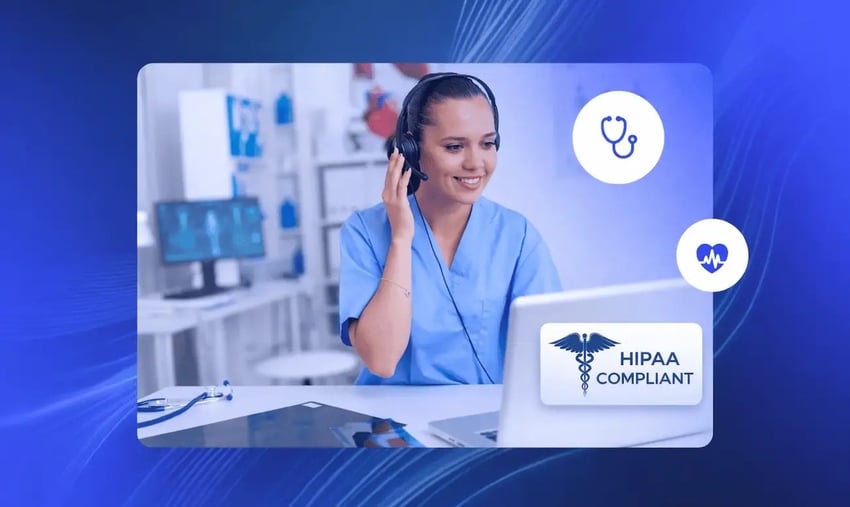Call centers are commonly used in the healthcare industry in small practices and large hospital systems. Call center agents need to know how to handle inbound and outbound patient calls with care and sensitivity. They also need to be mindful of federal privacy regulations like the Health Insurance Portability and Accountability Act (HIPAA).
For this reason, many healthcare organizations choose to work with dedicated medical call centers that rely on HIPAA-compliant healthcare phone service. This post will discuss best practices for healthcare centers looking to improve agent performance and patient satisfaction.
What Is a Healthcare Call Center?
A healthcare call center is a specialized communication hub that manages outbound and inbound calls for medical organizations such as doctor’s offices and insurance providers. It serves as a point of contact for patients, offering services that include handling appointments, inquiries, billing, insurance verification, and even emergency support.
Healthcare call centers are often responsible for facilitating communication between patients and healthcare professionals. As such, they play a critical role in patient care management, information dissemination, and administrative support.
In many cases, these contact center solutions use advanced technology, including AI, to manage calls, data, and patient interactions efficiently — and securely.
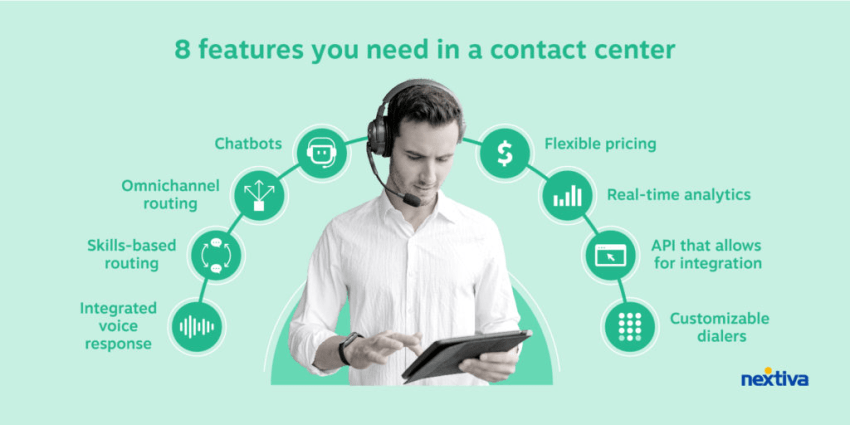
Because call centers can handle a significant call volume in a systematic way, patients can speak to someone quickly, whether they need to make an appointment or request a referral. Hyro’s State of Healthcare Call Centers report highlights that 49% of patients are dissatisfied with the service they receive from their healthcare provider’s call center. Respondents voiced their frustration: 38% “Unsatisfied,” 7% “Somewhat Unsatisfied,” and 4% “Very Unsatisfied.”
The problem is as clear as day: Patients are not receiving the support and care they expect. Upgrading your phone system and exercising healthcare call center best practices can increase patient satisfaction rates significantly, boosting healthcare providers’ patient retention rates.
Differences Between Small and Large Healthcare Call Centers
Healthcare call centers are classified as either small or large, and while both are likely to use cloud-based technology, there are a few key differences between them.
Small healthcare call centers
Small call centers typically have between five and 25 call center agents. This is what you need to know about them:
- Limited Resources: Due to a leaner staff and budget, they often have fewer specialized roles and might not be open 24/7.
- Personalized Interaction: These centers are more likely to offer personalized, direct communication with patients.
- Simpler Tech Requirements: They may not need all the bells and whistles that an enterprise contact center would require; this can keep costs low.
- Flexibility: There is often greater flexibility in adapting to patients’ needs or changes in operations thanks to more personalized interactions, because these interactions enable a deeper understanding of individual patient histories and preferences.
- Generalist Staff: Staff may need to perform multiple functions, from appointment scheduling to handling billing inquiries.
Small call centers may work best for small practices looking for additional phone call management, especially if they want to offer personalized care for their patients.
Large healthcare call centers
Large call centers may have well over a hundred agents and are likely to be available 24/7. Here’s what you need to know:
- Extensive Resources: A larger staff and higher budget allow for more specialized roles and departments, which may result in greater efficiency in solving patient concerns.
- Advanced Tech Requirements: Large centers are more likely to use sophisticated call center software features, including AI and data analytics.
- Structured Protocols: More formalized and standardized processes and protocols are often incorporated for handling incoming calls.
- High Volumes: The increased headcount results in being better equipped to manage a higher volume of calls and diverse inquiries.
- Specialized Teams: Teams may be specialized in specific areas, such as billing, appointments, or insurance verification, which can improve the patient experience.
Best Practices for Handling Healthcare-Related Calls
Medical call center agents have important jobs, and knowing how to best handle different healthcare-related calls can improve agent performance and patient satisfaction.
1. Appointments
Appointment scheduling is one of the most common use cases for healthcare call centers. Follow these best practices to improve customer interactions when onboarding new patients or managing appointments:
- Use an organized scheduling system to manage appointments efficiently.
- Confirm appointment details with the patient, including time, date, location, and anything they may need to bring to the appointment.
- Implement a painless rescheduling and cancellation process.
- Send automated reminders via calls, texts, or emails based on provider or patient preferences.
2. Insurance updates
Agents will almost always need to enter and verify insurance policies when working with new patients, and they may need to help existing patients update their insurance information. This technical information has a direct impact on patient care and expenses, so make sure you get it right by doing the following:
- Be patient and empathetic, as insurance topics can be confusing for patients.
- Train staff to understand various insurance plans and policies.
- Keep a database of insurance providers and policy details for reference.
- Offer clear, concise information about insurance coverage and patient responsibilities.
Both medical call centers and insurance companies should follow these best practices. They should also make sure they’re using a reliable, adaptable, and secure phone system.
👌 Case Study: How Nextiva Changed the Game for Concordia Care

3. Making payments
Call centers can process payments and provide instructions so patients can pay via other methods. These are the best practices to consider:
- Provide multiple payment options (online, phone, and mail).
- Ensure secure and compliant handling of financial information.
- Offer clear explanations of charges and billing processes to callers.
- Provide options for payment plans or financial assistance if needed, including where patients can go to receive additional information.
4. After-hours answering services
Healthcare organizations often take advantage of call centers’ round-the-clock availability to offer after-hours answering services. Since these calls may involve patients with active concerns, it’s important to implement the following practices:
- Use an efficient call routing system to direct calls to the appropriate on-call staff.
- Ensure that after-hours staff are trained and knowledgeable.
- Provide clear instructions to patients about when and how to seek after-hours care.
- Record messages accurately for follow-up during regular hours.
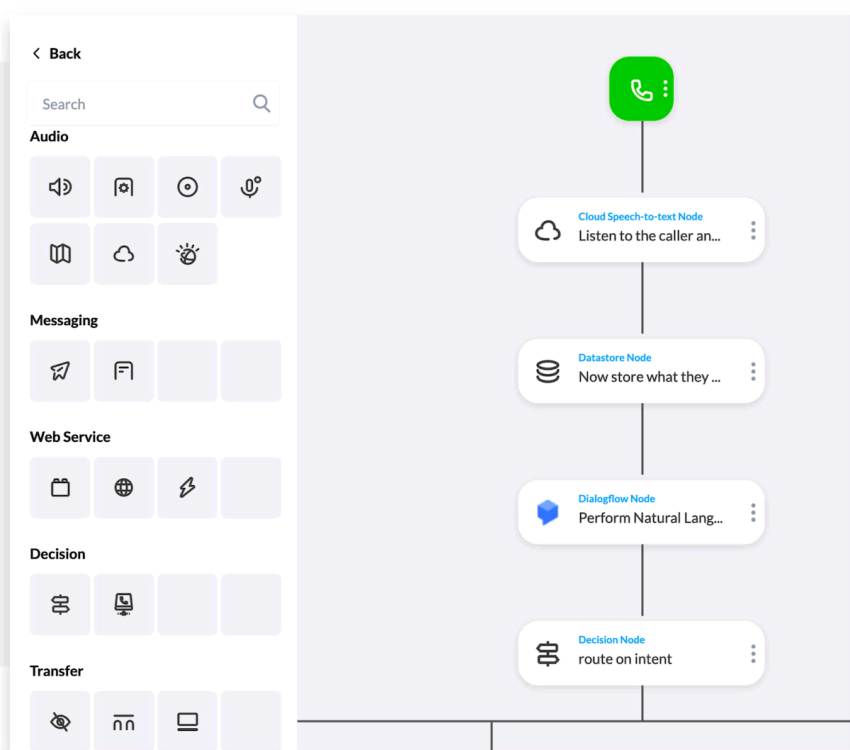
5. Crisis management and emergency calls
Ideally, patients will call 911 during an emergency. Sometimes, however, they may not realize that their situation is urgent or may need to speak to a specific care provider regarding their emergency. It’s critical to follow these practices to handle crisis and emergency calls:
- Have clear protocols for handling emergencies and urgent calls.
- Train staff to recognize and escalate emergency situations appropriately.
- Provide resources and support for staff dealing with stressful calls.
- Route emergency calls, whenever possible, to experienced agents who are good under pressure.
6. Other common calls
In addition to the call types listed above, healthcare call centers also field calls for general inquiries, prescription refills, health records, lab results, and more. Here’s how you can support your agents to best manage these calls:
- Implement a knowledge base for staff to quickly address common questions (FAQ for agents).
- Use a secure messaging system for prescription refills and lab results.
- Train staff to handle a wide range of inquiries professionally and efficiently.
- Maintain patient confidentiality and comply with HIPAA regulations.
🇺🇸 Case Study: How Veterans Home Care Helps Military Families Secure Long-Term Care

Top Tips to Optimize Healthcare Call Center Performance
Knowing what types of calls to expect is half of the battle when it comes to healthcare call centers; knowing how to optimize call center and agent performance is the other piece of the puzzle.
1. Using virtual contact center software
The easiest way to optimize and improve call center performance is to adopt virtual contact center software.
A virtual call center uses Voice over Internet Protocol (VoIP) communication for call center agents, which offers increased scalability and flexibility. It also can come with advanced features, such as call routing, which can reduce wait times, improve the patient experience, and streamline your team’s workflows.

Related: The Best Contact Center Software for 2024
Many of these services include data analytics to monitor call patterns, allowing you to optimize staffing based on expected needs. The analytics may include call center metrics like the following:
- Call abandonment rates
- Average handle time
- Average call times
- First call resolution rate
Make sure that you choose a phone service solution that prioritizes data security. Look specifically for a company that notes compliance with healthcare regulations, including HIPAA. Look for a provider with healthcare phone service solutions.
2. Patient experience and empathy
All customer support teams should ideally have some natural empathetic instincts, but it’s particularly important for agents handling patient calls.
Your call center should prioritize patient-centric communication: Listen actively, address the patient’s concerns to the best of their ability, and show empathy. It’s not the agent’s fault that the patient waited six months for an appointment that just got canceled, but expressing their sympathy for the difficult situation and working to find the best solution possible can dramatically impact how the patient feels about the experience.
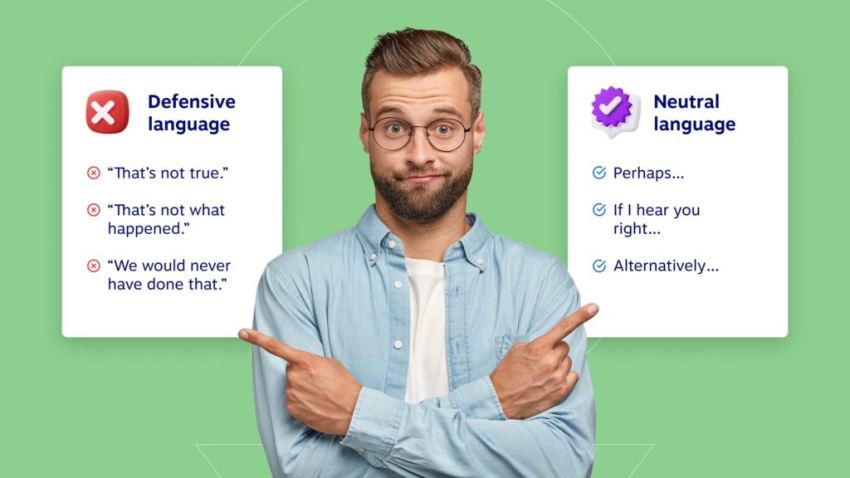
Continuously train staff regarding empathetic patient communication, especially when dealing with upset or difficult customers. Incorporate patient feedback into training notes to help agents improve their performance and to address potential concerns about feedback.
Staff should learn call center soft skills to help them maintain a calm and professional demeanor in all interactions. These skills can improve patient engagement and directly impact how they feel about the practice or their care providers.
3. Continual training and quality assurance
Just like any other organization, a healthcare company is always evolving, so it’s important to train your staff regularly on new policies, procedures, and technology. Stay updated on healthcare trends and best practices by collaborating with the healthcare organizations you work with and watching for new best practices for healthcare call centers.
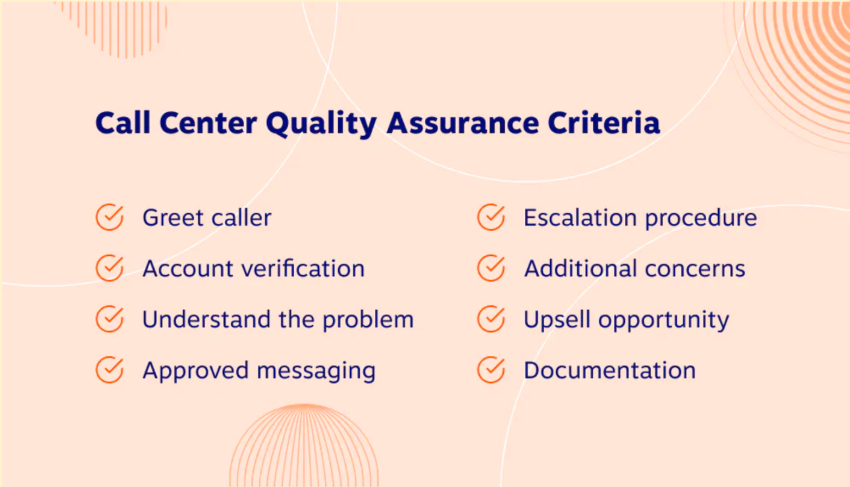
You should also monitor calls for quality assurance and provide constructive feedback to improve the patient experience.
Related: Top Benefits of Call Center Software for Insurance Agencies
Keep HIPAA in Mind at All Times
There’s one more critical thing that medical call centers must always keep in mind: HIPAA.
HIPAA is a federal law that protects sensitive patient health information. It requires that all professionals involved in healthcare — including healthcare call centers — maintain patient privacy standards.
Not only does this mean that agents can’t head home and talk about a patient’s personal health information with their friends but also that healthcare contact center management involves data security practices to uphold HIPAA requirements.
Let’s dive deeper into what medical call centers need to know about HIPAA.
Using HIPAA-compliant VoIP
All call centers working in the healthcare industry should choose a HIPAA-compliant VoIP solution.
VoIP technology that’s compliant with HIPAA will ensure that patient information shared through the platform remains secure and confidential. For this reason, healthcare providers, clearinghouses, health plans, and other associated businesses often use these services.
“Ensuring that we were on a secure, HIPAA-compliant platform that was tested and validated was [the] highest priority. Knowing that the system you communicate on has that security just makes our business much more efficient.”
~ Joseph Berardo, CEO, Concordia Care
Types of communications protected by HIPAA
HIPAA compliance extends to multiple communication channels, including the following:
- Phone calls
- SMS text messages
- Faxes
- Team communication platforms (including email and instant messaging)
- Video conferences
- Voicemail messages
Each of these communication channels must be secure, encrypted, and accessible only to authorized personnel. For this reason, choosing a contact center solution like Nextiva that has HIPAA compliance built in is a critical first step.
Risks of HIPAA non-compliance
So what happens if you don’t comply with HIPAA? The short answer is: It’s not good.
Not only could you put sensitive and private patient information at risk, you could be severely penalized. Non-compliance can lead to fines, a devastatingly poor customer experience, lawsuits, and even a permanently damaged reputation for your call center, not to mention lost customers and the risk of going out of business.
Fines for HIPAA violations can cost more than $2 million, and in some cases, potential jail time may be involved:
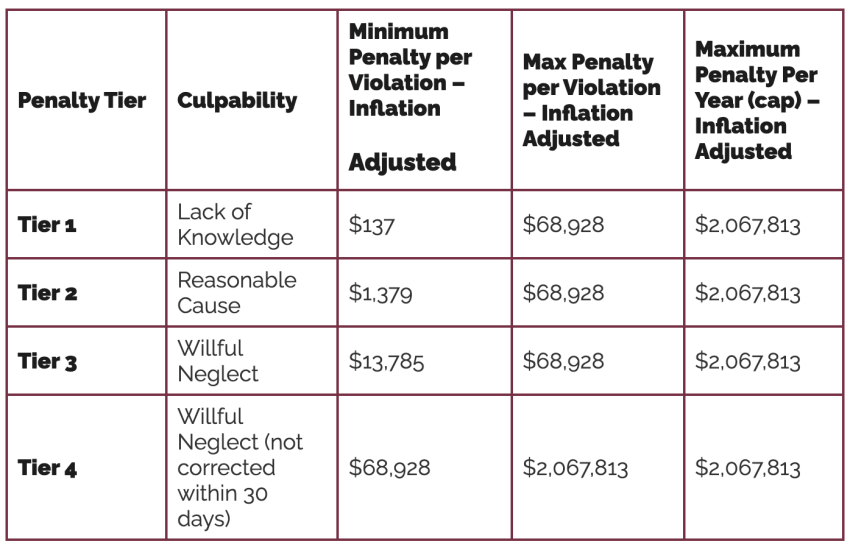
Recent cases of HIPAA violations and associated fines can be found here.
Staying ahead of HIPAA compliance
To remain compliant, healthcare businesses should do the following:
- Execute a business associate agreement that establishes a legally binding agreement between HIPAA-impacted businesses and their business associates.
- Encrypt all communications, regardless of the communication tool.
- Use approved communication tools that offer HIPAA compliance.
- Maintain accurate call logs.
- Protect call recordings with encryption and controlled access.
- Disable non-compliant features.
- Educate the team on HIPAA standards and train the team regularly.
Related: Call Center HIPAA Compliance: Top Features & Vendors
Choose a Trusted Healthcare Call Center Provider
Training your staff to uphold HIPAA and deliver strong, empathetic patient experiences is important, but you also need a trusted VoIP provider that’s reliable, scalable, and HIPAA-compliant.
Nextiva can help with that.Just see how Elkhart Clinic treats patients as people, with scalable healthcare communications across eight locations.
“Being able to make and receive calls reliably is crucial. By switching to Nextiva, we haven’t had any issue[s] contacting patients, no matter what phone network they’re on. Our phones are more reliable now, and we can communicate with patients, providers, and pharmacies.”
~Jeff Rudd, IT Manager, Elkhart Clinic
Nextiva offers HIPAA-compliant VoIP services that include inbound and outbound phone calls, virtual fax, SMS messaging, and video conferencing solutions. We automatically implement a business associate agreement and limit certain functionality for all healthcare call centers to protect patient data and the healthcare center.
We also offer the following:
- Easy, guided onboarding and integration.
- Exceptional reliability, with 99.999% uptime, so you never miss a call.
- Automatic security features, including encryption.
- Call forwarding and transferring.
- Desktop and mobile access.
- Call recording.
- Auto-attendants to direct calls to the correct place.
You can trust Nextiva’s high uptime, advanced call routing and forwarding, and detailed data analytics to ensure that your team is able to answer every call to deliver an outstanding patient experience.
Get call center software from Nextiva.
IVR, call recording, VoIP numbers, call routing, advanced reporting — integrated in ONE cloud platform.

















 Customer Experience
Customer Experience 











